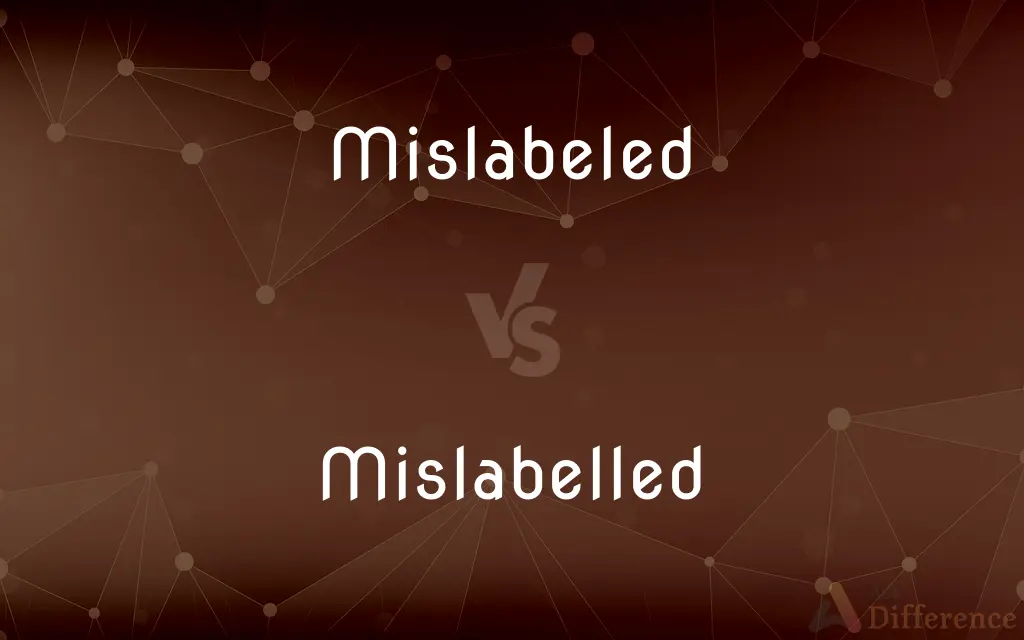Mislabeled vs. Mislabelled — What's the Difference?
By Fiza Rafique & Maham Liaqat — Updated on May 2, 2024
"Mislabeled" and "mislabelled" are both correct spellings, but "mislabeled" is preferred in American English, whereas "mislabelled" is the preferred spelling in British English.

Difference Between Mislabeled and Mislabelled
Table of Contents
ADVERTISEMENT
Key Differences
"Mislabeled" is the American English spelling for describing something that has been labeled incorrectly. It follows the general American English convention of simplifying spellings by using fewer letters. On the other hand, "mislabelled" is the British English version, which often retains additional letters in words, as seen in other examples like "travelled" and "cancelled".
While American English typically uses a single 'l' in the past tense and past participle forms of verbs that end in a vowel plus 'l', British English doubles the 'l'. Therefore, "mislabeled" in the U.S. contrasts with "mislabelled" in the UK.
Both "mislabeled" and "mislabelled" are grammatically correct and convey the same meaning: the action of assigning an incorrect label to something. The choice between them depends largely on the regional writing standards being followed.
In terms of usage, "mislabeled" is more commonly seen in American publications and writing, while "mislabelled" appears in British texts. This difference reflects broader differences in American and British spelling conventions.
The decision to use "mislabeled" or "mislabelled" should be based on the intended audience. If writing for an American audience, "mislabeled" would be the appropriate choice; for a British audience, "mislabelled" should be used.
ADVERTISEMENT
Comparison Chart
Spelling Standard
American English
British English
Letter Doubling
Single 'l'
Double 'l'
Usage
Preferred in the USA
Preferred in the UK
Grammar Rule
Simplified spelling
Traditional spelling
Example
"The product was mislabeled."
"The product was mislabelled."
Compare with Definitions
Mislabeled
Wrongly classified or described.
The report was mislabeled as complete when it was still a draft.
Mislabelled
To mistakenly label or tag.
The samples were mislabelled during the experiment.
Mislabeled
Incorrectly tagged with a label.
The jar was mislabeled as sugar but it contained salt.
Mislabelled
To label something incorrectly.
She mislabelled the chemical containers, which could be hazardous.
Mislabeled
To label something incorrectly.
He mislabeled the files, causing confusion.
Mislabelled
Incorrectly tagged with a label.
The packet was mislabelled as vegetarian but contained meat.
Mislabeled
To apply a wrong label to an item.
The museum exhibit was mislabeled, misleading visitors about the artifact's origin.
Mislabelled
To apply a wrong label to an item.
The products were mislabelled, affecting the stock inventory.
Mislabeled
To mistakenly label or tag.
The medication was mislabeled, leading to a dangerous mix-up.
Mislabelled
Wrongly classified or described.
The book was mislabelled as fiction when it is actually a biography.
Mislabeled
To label inaccurately.
Mislabelled
To label inaccurately.
Mislabeled
Simple past tense and past participle of mislabel
Mislabelled
Simple past tense and past participle of mislabel
Mislabeled
Branded or labeled falsely and in violation of statutory requirements;
Confiscated the misbranded drugs
Common Curiosities
Is "mislabeled" considered incorrect in the UK?
While "mislabeled" is not the preferred British spelling, it is still understood and not considered grammatically incorrect.
Can the spelling of "mislabeled" affect readability for international audiences?
Yes, spelling variations can affect readability and the perceived correctness of the text depending on the reader's familiarity with American or British English conventions.
Why does British English use "mislabelled"?
British English tends to follow more traditional spelling rules which often include doubling consonants when adding suffixes.
How do dictionaries handle variations like mislabeled and mislabelled?
Dictionaries typically list both variations, noting the preferred usage in American and British English.
Is "mislabelled" considered incorrect in the US?
Similar to the UK situation, "mislabelled" is less common in the US but still recognized as a correct form.
How do multinational companies handle spelling differences in their communications?
Multinational companies often adopt a specific English variant for corporate communications or adjust the spelling based on the regional audience of a document or presentation.
Why does American English prefer "mislabeled"?
American English prefers simplified spellings, typically reducing the number of repeated letters.
What other words follow similar spelling differences between American and British English?
Words like "cancelled/canceled," "travelled/traveled," and "labelled/labeled" follow similar patterns.
How can educators teach students about differences between American and British spellings?
Educators can highlight common patterns, provide comparative examples, and encourage awareness of audience and purpose in choosing spellings.
How should writers choose between American and British spelling in academic writing?
Writers should choose the spelling consistent with the style guide or publication standards they are adhering to, usually dictated by the country of the institution or publisher.
What tools can help writers ensure consistency in American or British spelling?
Spell checkers with language settings, style guides, and editing software configured to specific English variants can assist in maintaining consistency.
Are there online resources that compare American and British spellings?
Yes, several educational websites and online dictionaries provide comparisons and explanations of different spelling practices between American and British English.
Can using the wrong variation of "mislabeled" or "mislabelled" impact SEO?
Yes, using the variation that aligns with the search preferences of the target audience can impact the visibility and SEO of content online.
Are there any exceptions to the rule of doubling consonants in British English?
Yes, there are exceptions based on whether the stress is on the final syllable, such as in "benefited" vs. "benefitted," where both forms can be correct depending on the pronunciation emphasis.
What are the implications of spelling variations for English language learners?
Spelling variations can add complexity to learning English, requiring learners to be aware of the context and regional preferences in language use.
Share Your Discovery

Previous Comparison
Transceiver vs. Transducer
Next Comparison
Cucumber vs. DillAuthor Spotlight
Written by
Fiza RafiqueFiza Rafique is a skilled content writer at AskDifference.com, where she meticulously refines and enhances written pieces. Drawing from her vast editorial expertise, Fiza ensures clarity, accuracy, and precision in every article. Passionate about language, she continually seeks to elevate the quality of content for readers worldwide.
Co-written by
Maham Liaqat













































